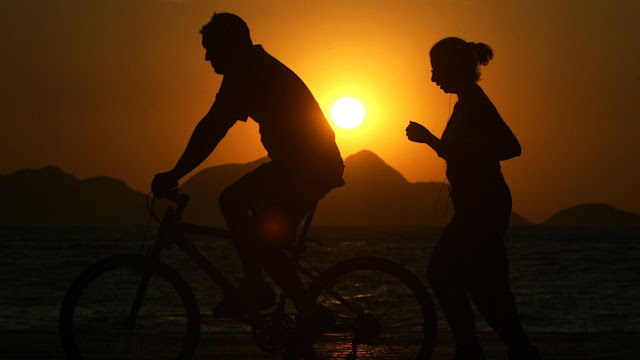Now this study, published in The Psychology Society, was very specific to a type of workout - participants hit the exercise bike for six all-out one-minute sprints followed by four minutes of rest, for a 30-minute workout between 6-7 am, 2 - 4 pm and 7 - 9 pm. The result? 'They had lower levels of the hunger hormone GHRELIN and it did not affect their quality of sleep even when they worked out as late as 9 pm.
Working out in the morning — especially
on an empty stomach — is the best way to burn stored fat, making it ideal for weight loss. That’s largely because the body’s hormonal composition in the morning is set up to support that goal, says Anthony Hackney, a professor in the department of exercise and sport science at the University of North Carolina Chapel Hill.
“In the early morning hours, you have a hormonal profile that would predispose you to better metabolism of fat,” Hackney says. People naturally have elevated levels of cortisol and growth hormone in the morning—both of which are involved in metabolism—so you’ll “draw more of your energy from your fat reserves,” Hackney says. That can potentially help with weight loss.
Research also suggests that morning exercisers may have less of an appetite throughout the day, which could also help protect them from putting on pounds.
Even if you hate early alarms, working out first thing in the morning can quickly become second nature. A
study recently published in the Journal of Physiology found that exercising at 7 a.m. may shift your body clock earlier, meaning you’ll feel more alert in the morning and get tired earlier in the evening, potentially priming you to
get enough rest to wake up and do the same thing the next day. Some
research even suggests that it’s easier to stick to healthy habits completed in the morning.
Afternoon workouts are almost as good
Morning workouts are ideal for burning fat and losing weight, but afternoon workouts may give your performance a boost, since you’ll have eaten a meal or two by the time you get going. “Any time you eat, your blood sugar levels rise,” Hackney says. “Sugar in the form of blood glucose…is one of the things we need if we’re trying to work at a higher intensity.”
An afternoon workout can also be a great way to avoid an end-of-the-day slump. The
Journal of Physiology study found that exercising between 1 p.m. and 4 p.m. can shift forward your body clock in the same way as an early morning workout. Even
taking a quick walk may help you perk up and refocus.
One preliminary paper from 2018 found that your body
naturally burns about 10% more calories in the late afternoon, compared to the early morning and late night. The researchers looked at bodies at rest — so they can’t draw firm conclusions about what happens when people work out — but it’s possible that you could burn a little extra energy if you move in the afternoon.
Nighttime workouts still come with perks
The bottom line
"The stress hormone cortisol, which aids in the storage of fat and reduction of muscle tissue", peaks in the morning and decreases throughout the day and during exercise. If you have to pick a best time to exercise, morning would win, Hackney says. Early workouts make the most of your biology and psychology, potentially leading to better results and adherence over time. But there’s really no bad time to exercise, Hackney reiterates, and the most important thing is finding the time to do so, whenever works for you.
If you enjoyed this article, subscribe it!
Stay Fit!
MOVEMENT FOR HEALTH

Thank u so much mam once again for the useful information u shared...today's life is really hectic that we cannot spare much time for our health....This kind of information motivate us to make some time for ourselves and do some exercise to stay fit and healthy...thank u once again👍👌
ReplyDeleteThanks a lot reader. You can put forward your concerned areas,
DeleteI will write article on that in future.